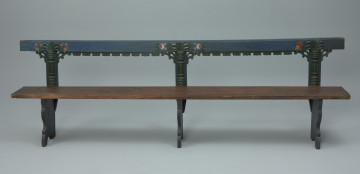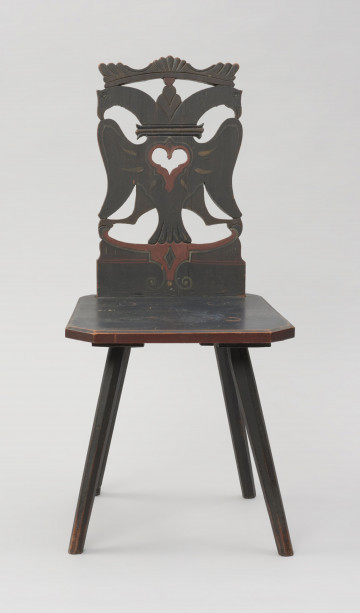
Bench
1. połowa XIX wieku
National Museum in Szczecin
Part of the collection: Pyrzycka folk culture
Nowadays, a table is one of the primary pieces of furniture at home. However, in the not so distant past, it was used only in unusual situations: it was the place where ceremonial meals were eaten during annual special days (e.g., Christmas Eve supper) and family holidays (e.g., weddings), and where special guests were seated (e.g., a visiting priest or doctor). It stood in a prominent place of the room in everyday life, often serving as the family altar. It was forbidden to sit on it or place common items such as a hat, pipe, or apron. It also played an essential role in wedding rituals. It began to be used for everyday meals in the second half of the 19th century in Pomerania and Greater Poland and some parts of Poland only in the interwar period. The small table (90 × 54 cm) is a carpenter's, craftsman's product from the 2nd half of the 19th century. It has a simple construction referring, like many pieces of folk furniture, to Gothic patterns. The rectangular top is supported on two upturned 'T’-shaped supports connected in the middle by a crossbar fastened with wedges. The table is painted entirely in navy blue, while the top and the board connecting the legs are decorated with painted flowers in yellow, green, red and white. The tabletop is decorated with a stylised vase (symbolising the heart, the seat of feelings and vitality) with flowers of tulips, daisies/marguerites and the so-called bells. The board is decorated with tulips as the flowers ensuring the multiplication of wealth and fortune. The table stood in a prosperous house in Pyrzyce and was not used for everyday activities, but representative functions, as indicated by the rich painting.
Iwona Karwowska
Author / creator
Dimensions
cały obiekt: height: 76 cm, width: 54 cm
Creation time / dating
Creation / finding place
Identification number
Location / status

1. połowa XIX wieku
National Museum in Szczecin

1176 — 1225
National Museum in Szczecin

przełom XIX i XX wieku
National Museum in Szczecin
DISCOVER this TOPIC
National Museum in Szczecin
DISCOVER this PATH
Educational path